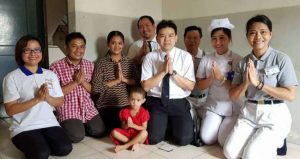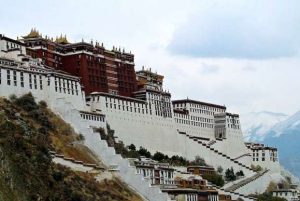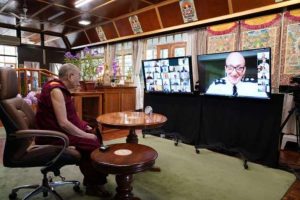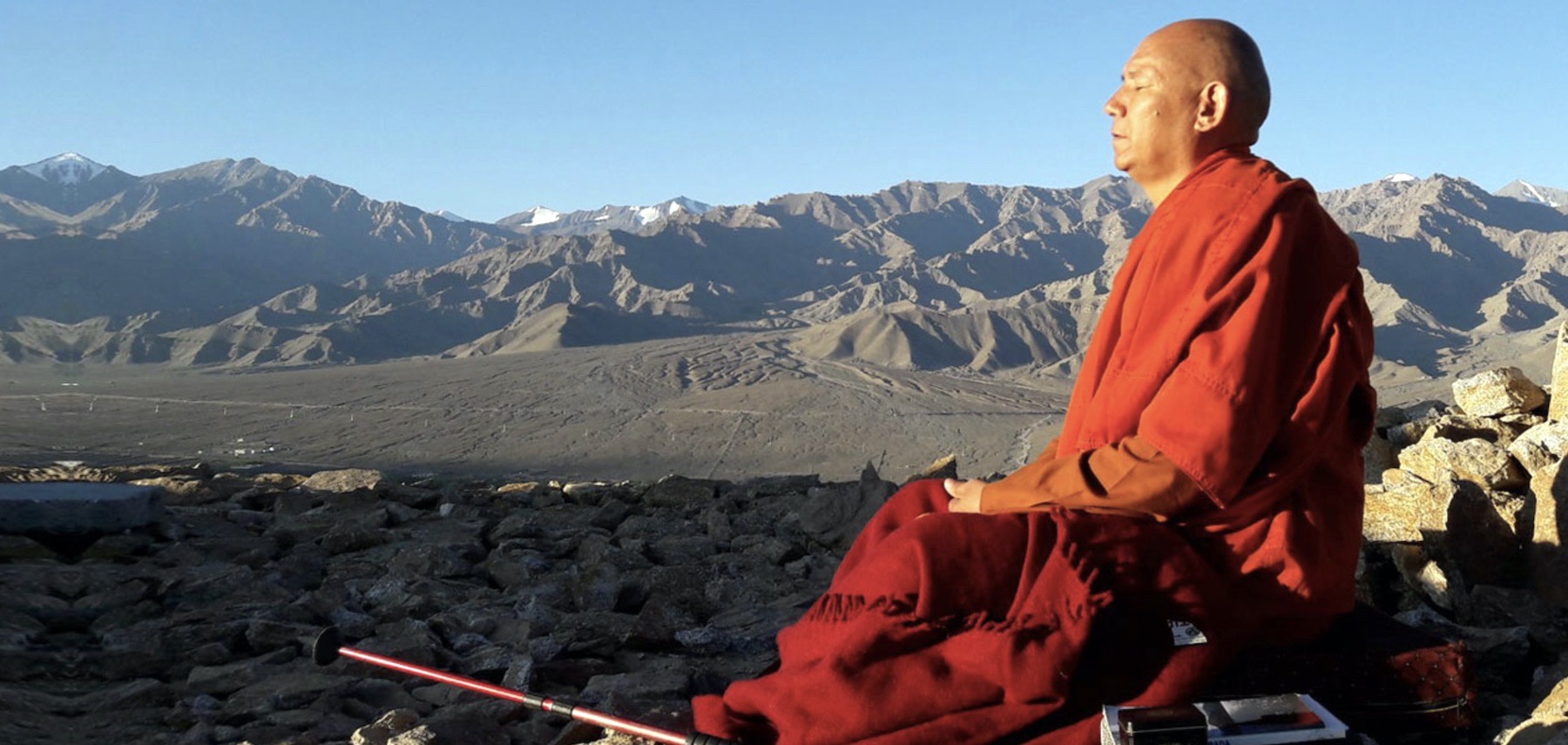
Temperatures are rising, Himalayan glaciers are melting, and increasingly authoritarian, autocratic governments are unabashedly jostling for ever more power and influence, as communities and societies around the world struggle to come to terms with the individual and collective repercussions of a global pandemic. Amid a seemingly endless flowing river of news, views, opinions, and speculation on the dire state of the world, one might be forgiven for thinking that little light reamins to offer a glimmer of hope for the future. Yet it is, paradoxically, often in times of extreme suffering, that profound and fundamental change can occur.
One such light is the far-reaching engaged Buddhism of Venerable Bhikkhu Sanghasena—founder, president, and spiritual director, of the Mahabodhi International Meditation Center (MIMC), founder of the Save the Himalayas Foundation and the Mahakaruna Foundation, and adviser to the International Network of Engaged Buddhists (INEB), among numerous other roles. Despite being based in remote and landlocked Ladakh, in India’s arid far north, Bhikkhu Sanghasena’s reputation for compassionate relief and reform founded in the Buddhadharma has preceded him, belying his soft-spoken demeanor, and his influence has been felt around the world.
Perched high on the Tibetan Plateau, in India’s northern reaches, Ladakh, which translates as the Land of High Passes, last year became the largest union territory in India, spread across some 59,146 mountainous square kilometers,** although much of that landscape is desiccated and inhospitable. The culture and history of the people of Ladakh are closely interwoven with that of Tibet—so much so that Ladakh is sometimes known as “Little Tibet.”
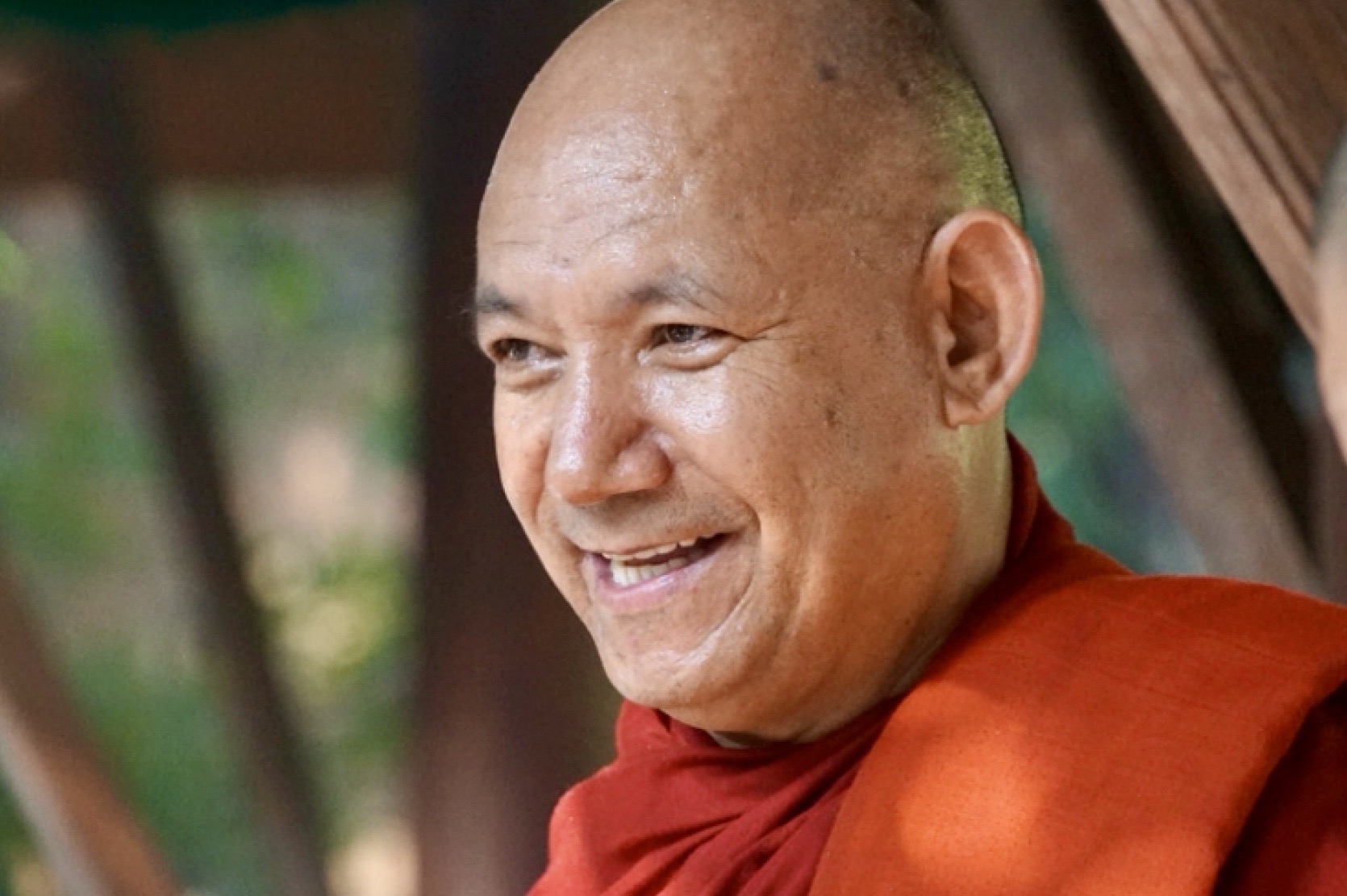
Even before the trials and tragedies that have accompanied the arrival of the COVID-19 pandemic, Ladakh and the greater Himalayan region were already facing a host of existential challenges on social, economic, political, and environmental fronts. Bhikkhu Sanghasena, however, has never been one to shrink from adversity.
“The world is now facing an unprecedented challenge due to the global outbreak of the deadly disease called COVID-19, which has spread across multiple countries,” said Bhikkhu Sanghasena. “With millions infected, the deadly coronavirus has already claimed the lives of hundreds of thousands of people worldwide. Communities and economies have been impacted everywhere, and the world is uniting to combat the COVID-19 pandemic, bringing governments, NGOs, and individuals together.”
Bhikkhu Sanghasena was born in Ladakh in 1958 to a deeply religious family. Following a brief stint in the Indian Army, he departed the mountains of Ladakh in 1977 to follow a spiritual call that saw him train in the Theravada tradition under the late renowned Indian Buddhist master Ven. Acharya Buddharakkhita (1922–2013), founder of the Mahabodhi Society Vihara, Bangalore (now Bengaluru). Having received full ordination, Bhikkhu Sanghasena immersed himself in the Dhamma intensively and studied various Buddhist meditation practices.
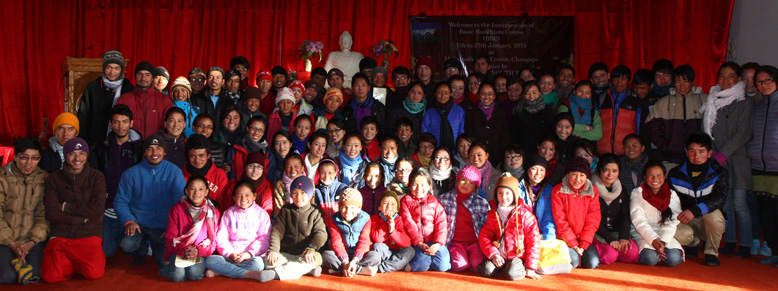
In 1986, Bhikkhu Sanghasena turned his vision of engaged Dhamma into a reality, founding the Mahabodhi International Meditation Center (MIMC) in Leh, the capital of Ladakh. He has since become an exemplar of socially engaged Buddhism, launching numerous projects, events, and initiatives, among them providing educational opportunities and refuge for underprivileged children, empowerment and literacy programs for women and other socially disadvantaged groups, healthcare for the sick and needy, and a care home for the aged and destitute.
The MIMC has evolved over the last three decades into an expanding campus that has become the hub and a launch pad for a multitude of socio-cultural and community programs to share the Dhamma through spiritual and community outreach.
At the time of publication on 26 August, India, grappling with the third-highest number of COVID-19 infections in the world, had reported 3.2 million confirmed infections, with 58,390 deaths so far recorded and 2.4 million recovered.* Ladakh itself has reported 2,330 confirmed cases of COVID-19 and recorded 23 deaths, having so far been relatively spared at least in part because it is one of the most sparsely populated regions of India, with a population of just 280,000.
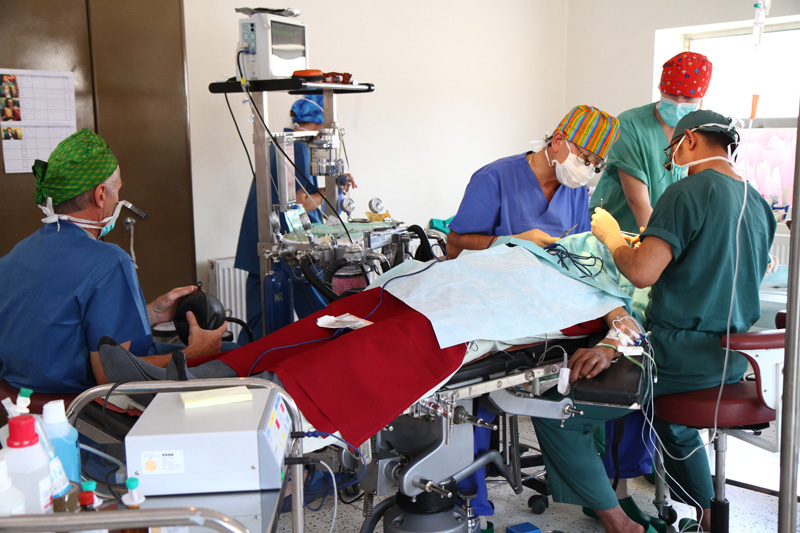
“The outpouring of global solidarity and support sparked by the shared challenge of the pandemic has been phenomenal so far,” said Bhikkhu Sanghasena. “The MIMC also in its own humble way has been at the forefront whenever a natural calamity or crisis situation has erupted in Ladakh or elsewhere by actively participating in relief and rehabilitation programs. Flash floods in Ladakh and Kashmir were the most immediate and recent cases in which we provided urgent relief materials and aid to affected communities and offered valuable services such as education and moral encouragement to the victims and their families.
“Our Mahabodhi Karuna Charitable Hospital has been offering its medical services to the people of Ladakh for the last three decades and we are very glad to offer this hospital in the service of people affected by the coronavirus, thus converting it into the only COVID-19 hospital in Ladakh. We pray and hope that the hospital will soon be able to transform corona into karuna!”
Since 1986, Bhikkhu Sanghasena has dedicated his life to service. Each year he undertakes a meditation retreat in his mountain hermitage, dedicating prayer and meditation for the benefit of sentient beings. This year, because of the pandemic and with tensions along India’s border with China escalating, Bhikkhu Sanghasena spent his time in retreat dedicating prayers and meditation to world health, peace, and harmony.
Early this year, just as the world was waking up to the scale of the threat posed by the SARS-CoV-2 novel coronavirus, the Mahakaruna Foundation and the MIMC organized a global prayer ceremony in Bodh Gaya on the full moon day of 9 March, dedicated to alleviating the sickness, grief, loss, and general suffering caused by the pandemic.
“Prayer has its own benefit and power,” Bhikkhu Sanghasena affirmed. “A genuine prayer of compassion, offered with a fullness of heart and an absence of self-regard can certainly play a very great role in overcoming the many physical, mental, emotional, and spiritual ailments that afflict our human experience.
“If you look carefully at this unprecedented crises faced by humanity, you will clearly see that the occurrence of the catastrophe is due to the teachings of karuna—compassion in human hearts—diminishing. When karuna completely disappears from human hearts and greed takes over, then human beings become blind and are capable of committing all kinds of unwholesome activities.
“More than 700 people, including sangha members representing the three major Buddhist traditions and lay devotees, gathered under the sacred Bodhi tree at Mahabodhi Vihara to dedicate compassionate prayers for overcoming the COVID-19 pandemic and for those affected and for people who are in a state of fear, worry, and despair,” he said. “We were informed that many people in different parts of the world joined in absentia to offer prayers at the same time. Special messages were shared from His Holiness Drikung Kyabgon Chetsang Rinpoche, Master Hsing Yun from Fo Guang Shan in Taiwan, and Ven. Palawadhammo (Dr. Pornchai Pinyapong), president of World Alliance of Buddhists.”

Image courtesy of MIMC
The MIMC’s work is possible thanks to the tireless efforts of dedicated teams of monks, nuns, teachers, doctors, social workers, community leaders, and care providers. The MIMC itself is home to a residential school for several hundred poor children from surrounding villages, an institute for the blind, a home for the aged, male and female monastic communities, and more, all founded upon the vision of a community based on socially engaged Buddhist principles.
In addition to integrating spiritual development and human welfare, Bhikkhu Sanghasena and the MIMC are also closely involved in numerous peace-building and inter-faith dialogues, environmental conservation activities, and in promoting Buddhist and Himalayan cultural heritage through national and international festivals. Bhikkhu Sanghasena himself has traveled extensively to participate international conferences, seminars, and workshops to promote spiritual and cultural values, environmental awareness, non-violence and world peace, and elevating the status of women in society—especially those from underprivileged communities.
“Furthermore, we are happy to share that through its Gujarat and Nagpur chapters, the MIMC has provided relief and aid to COVID-19 affected families in Gujarat and Maharashtra,” Bhikkhu Sanghasena noted. “Our dedicated team of members and volunteers have made a very good effort in reaching out to the most affected families and ensuring the proper distribution of the aid. Our members and volunteers are also arranging to distribute similar aid to affected citizens in Bodh Gaya and other parts of Bihar.”
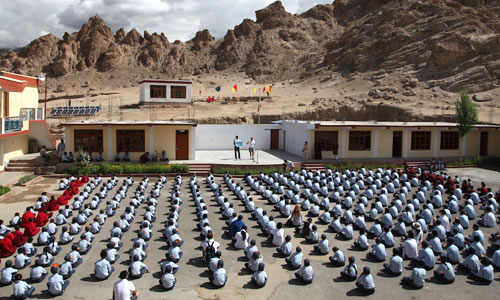
Still with an eye to a brighter, hopefully happier future, Ven. Bhikkhu Sanghsena is working toward yet another major improvement at the Mahabhodi campus in the form of a Buddha Park for World Peace. The proposed park is envisioned as a spiritual and humanitarian refuge, with several facilities planned, including meditation and yoga halls, a healing garden, and an interfaith complex.
“In 2017, Shri Ram Nath Kovind, president of India, visited the Mahabodhi campus, and laid the foundation stone for a new facility named the Buddha Park for World Peace,” Ven. Bhikkhu Sanghsena explained. “As the name suggests, this facility is envisioned as a kind of theme park—the theme being the Buddha and world peace—covering an area of about eight hectares of land presently lying barren. The park will be open to all, including local residents and domestic and foreign pilgrims. The creation of the park will be a way of greening this piece of land. The design and the architecture of the various facilities will be in accordance with the local style using construction technologies and materials that are environmentally and economically viable.”
Bhikkhu Sanghasena has been the recipient of numerous awards. In 2000, India’s Ministry of Social Justice and Empowerment presented him with the National Award for the Welfare of People with Disabilities. The Gandhi Peace Foundation honored him with the World Peace Award for the Year 2004. The American Biographical Institute recognized Bhikkhu Sanghasena as its Man of the Year 2002. The United Nations World Environment Day, Third World Congress in 2005, presented him with the Peace Environment Award. The International Centre for Advanced Studies and Research in Global Environment and International Institute of Ecology and Environment, Delhi has also appointed Bhikkhu Sanghasena as their Global Ambassador and Regional Director.
Can the Buddha’s teaching help the coronavirus-affected world? By merely intellectually listening to the teaching of the Buddha, you may not be able to stop the coronavirus immediately or miraculously. But if human beings take up the Buddha’s teaching seriously, certainly the Four Noble Truths can be applied to the pandemic. By applying the Four Noble Truths, great insight can be developed and a huge amount of unnecessary fear, tension, worry, and panic over the present situation of the world can be overcome.
We human beings suffer unnecessarily by not realizing and not accepting the law of nature and the law or karma. What is happening in the world today is not totally unexpected. Once we are born in this world, then facing old, death and such calamities and pandemics is inevitable. Even untimely mass deaths are not uncommon—the Buddha often mentioned: From the beginning, the world has been filled with a succession of calamities, over and above the unavoidable facts of illness, old age, and death. But if one carefully considers all the facts, one must be convinced that at the basis of all the suffering lies the principal of craving and desire. If greed can be removed, human suffering will come to an end.
This wisdom and light that flashed and radiated under the historic Bodhi tree in Bodh Gaya more than 2,500 years ago is of great significance to human destiny. It illuminated the way by which mankind could cross from a world of superstition, of hatred and fear, to a new world of light, of true love and happiness. — Ven. Bhikkhu Sanghasena
To support the work of the Mahabodhi International Meditation Center, please click here.
** Ladakh Becomes India’s First Buddhist-majority Union Territory Following Kashmir Bifurcation (Buddhistdoor Global)
See more
Bhikkhu Sanghasena
Bhikkhu Sanghasena (Facebook)
Mahabodhi International Meditation Center
Mahakaruna Foundation
Save the Himalayas Foundation
International Network of Engaged Buddhists





